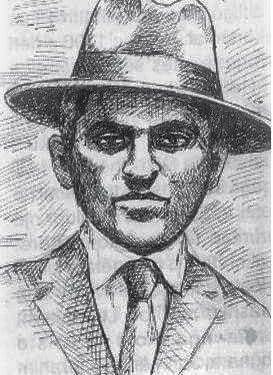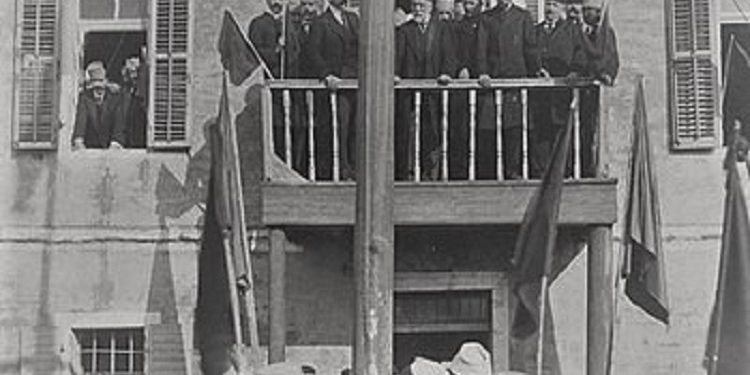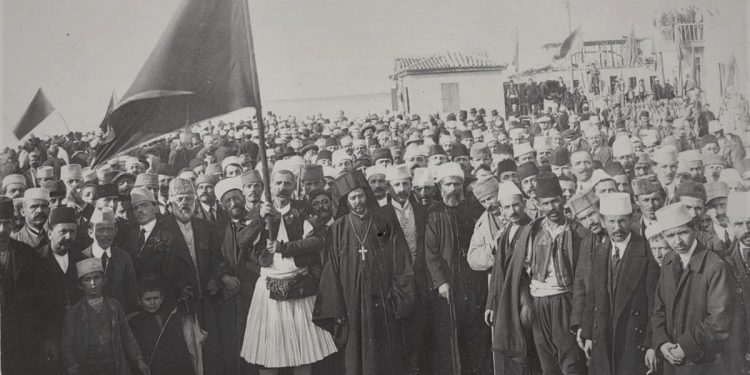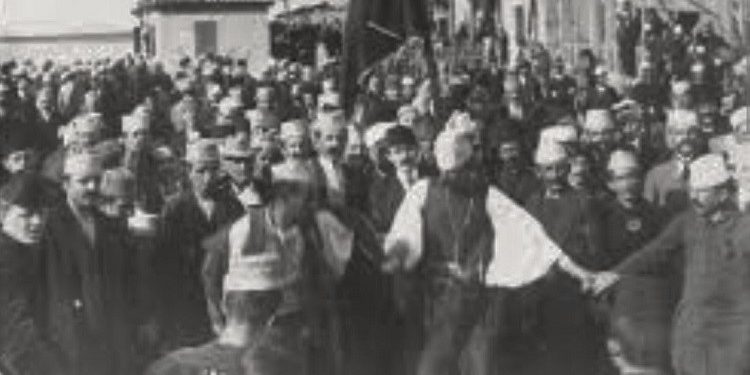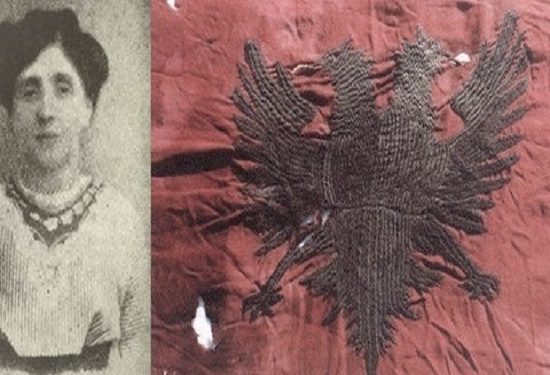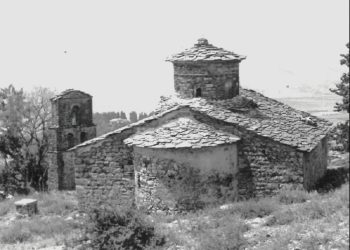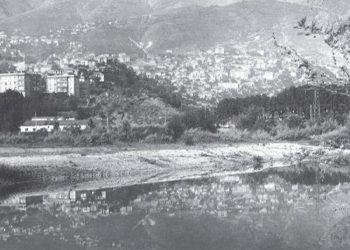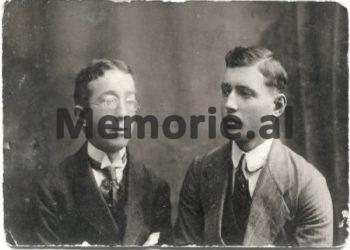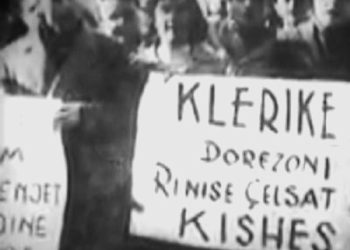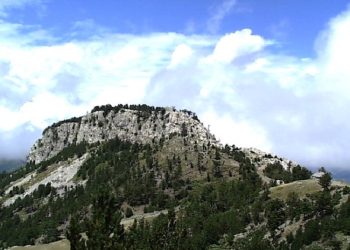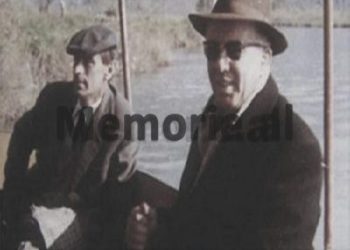By Gëzim Llojdia
The “Flamuri” newspaper of the “Balli Kombëtar” wrote in April 1950: “No bell announced the death of a signatory of Independence”!
Memorie.al / On April 11, 1950, the patriot Aristidh Ruci closed his eyes. No bell, however, announced his death! About the death of this patriot, the political emigration press wrote: “Died in Vlora, on April 11, 1950, Aristidh Ruci, member of the Regional Committee of the National Front for Vlora”. “They had imprisoned him as a merchant. His only request was: “Take me to my friends, the political convicts.” (“Flamuri” newspaper, May 1950).
The life of Aristidh Ruci
About the figure of one of the signatories of the historical Assembly of Vlora, Aristidh Ruci, the “mind of Vlora” is thus quoted in a publication, where there are few historical data as well as archival and facsimile documents.
Aristidh Ruci, “Mendje e Vlora”, – writes Etien Dilo in two publications, which he left after his accidental death. Aristidh Ruci’s name is associated with his efforts to open the first Albanian schools, since the end of the 19th century, with the fight for independence, the arming of freedom fighters, with the declaration of independence, the establishment of the Albanian administration, with the Epic of Vlora, with the endless struggle for a free, independent, democratic Albania; in short, it was the soul of the spirit of Albanianism. This author elaborates the story of the signatory Aristidh Ruci.
He was born in Sheper, Zagoria, on March 11, 1875. After completing (the first lessons) Mejtepi in his hometown, he attended the “Zosimea” gymnasium in Ioannina. In the years 1896-1898, he went to Istanbul, where he worked in a store that sold construction materials. In the years 1899-1904, he stayed in Ioannina, working in the grain market. After this year, he comes to Picar in Vlora, in Haxhi Muhamet’s fiefdom, as a housekeeper. From 1906 until the end of his life, he settled in the city of Vlora and engaged in trade.
Patriotic activity
Etien Dilo tells us that Aristidh Ruci, a close friend of Ilia Dilo Sheperi, who was also an education inspector in Vlora, has developed a wide national activity. He was a member of the “Labëria” club in Vlora; in 1908, he financed the purchase of weapons for the patriotic detachments and the spread of learning the Albanian language. Among other interesting data, there are those where it is said that in July 1911, he was a member of the organizing committee of the Assembly of Drashovica, in support of the Memorandum of Greece.
Then he went to Italy together with other patriots from Volonia where they met with Ismail Qemali and there they talked about the organization of the National Movement. There was correspondence with Andon Zako Çajupin, Jani Vruhon and Sotir Kolea.
In the year of the raising of the flag in 1912, the name of Aristidh Ruci, as a representative of Vlora, is recorded in the National Assembly of the Declaration of Independence and the raising of the Flag. During the years of the government of Vlora, it developed an extensive activity in its support for the solution of economic and financial problems. He helped to set up the administration in Fier, Vlore, Tepelena, Gjirokastër and Delvina.
In the years 1918-1920, he was involved in a wide national activity against the Italian invaders. He was a member of the commission for organizing the anti-Italian demonstration, on the occasion of November 28, 1919, at the Mosque of Tabakve.
Together with other patriots such as Osman Haxhiu, Beqir Sulo, Ymer Radhima and Abaz Mezini, they sent a letter to the Provisional Government of Durrës, where they protested the oppressive attitude of the Italian invaders towards the people of Vlora. (A.Q.Sh. Fondi. DPB, file no. 48). Then he took part in the Vlora war, 1920, against the Italian invaders. In the fire of this war, the patriotic society “Përlindja Kombëtare” was created, where the commission charged Aristidh Ruci and several other patriots, to draft its regulations. (AQSH, fund 518, doc. no. 640026).
The “National Defense” committee commissioned him to accompany the musical band of the Federation: “Vatra” and the American Red Cross Commission, on the war front and in the years 1920-1924, he was involved in the country’s democratic movement, in the “Homeland” federation ” and the company “Union”. A special role was played in the province of Himara and Gjirokastra.
Aristidhi collaborated with Volhonian patriots, such as: Osman Haxhiu, Ali Asllani, Qazim Kokoshi, Murat Terbaçi, Abaz Mezini, Ibrahim Abdullai and Dom Mark Vasa. Likewise, he helped the Albanian Autocephalous Church and Visarion Xhuvan. In the years 1921-1939, he was also a member of the Administrative Council of the Municipality of Vlora. In addition to the trade he had in Vlore, he was also an entrepreneur in the Tobacco Factory in Durrës.
In 1937, Aristidhi was elected a member of the leadership of the Albanian National Bank. In the newspaper “Jeta e re”, on August 5, 7, 1938, (according to the documents available to Etien Dilo) it is written: “We especially wish our friend Mr. Aristidh Ruci, who is a proven patriot of a broad intelligentsia of our Vlora…”!
In April 1939, together with Ali Asllan, mayor of Vlora and doctors Vasil Dhimitri and Pavlo Pavli, they created the Red Cross Branch for Vlora. During the Second World War, as an anti-fascist, he was arrested and exiled by the Italian invaders in Italy….” (Historical Museum of Vlora).
Retouching of the Independence document
For the main document signed in Vlora, on the day of the flag raising, it remains a mystery where this major act may have ended, while its photocopy is still available. Photocopy of the document of the Declaration of National Independence, from the Assembly of Vlora on November 28, 1912, which was found in Aristidh Ruci’s bookcase.
…The signature A. Rruci is clearly read (rrlr, turning the hard ‘rr’ into a soft ‘r’ is a feature of civic speech). In the document of the act of Independence, which was also published on the occasion of the 100th anniversary of Independence (and which was known in the past 50 years), there remained a puzzle as to why the signatures were removed and the photographs were placed?! Etien Dilo brings us this interesting piece of information: In the photo, Aristidh Ruci is on the left, in the second row, right next to Ismail Oemali”.
On November 28, 1912, after the Declaration of Independence, Ismail Qemali with his friends and the people behind went to the mosque and the main church of the city, to listen to religious prayers, led by Albanian clergy. Even in mosques and churches, they need to stand up and wave two flags of Albania. Always according to the documents of the Elbasan patriot Lef Nosi, these two flags were found in the houses of Mr. Aristidh Ruci and Eqrem Vlora” (Adem Hodo, Rev. “Our Time”, p. 9, No. 10-11-12, year XII, October-December 1973).
Aristidh Ruci’s correspondence with Ilia Dilo Sheperi was dated November 28, 1912. Aristidhi wrote to him from Vlora about those historical moments that the country was passing through, about his friendship with Ismail Qemali. When the Declaration of Independence was drafted, he made this remark: “It is not as enthusiastic as the Declarations of Independence of other countries”! Ruci compared the Declarations of Austria, Italy, and Greece… and it seemed to him that our declaration lacked that flame of enthusiasm…!
Ismail Qemali, had convinced him that, “and the way it is drafted, it is good that it avoids objections and then, the cooling of some”. In the correspondence that they have had, there were such thoughts: “Albania faced the dangers of the weather. It became half of Albania. Albania could not be complete. The Albanian remained Albanian in blood, language, customs and vices. It remained to strengthen the national feeling.
“Dobicet e kombi” (Voltaire’s expression), that’s what they called those who didn’t worry about the fate of the homeland, still divided and divided into tribes and provinces. (Cleared from a recording of a conversation with Q. Dilo, that the correspondence was burned together with the library of Ilia Dilo Sheperi).
Among other important documents and events, we highlight:
“In September 1914, Vlora surrendered to the rebels of the government led by Mustafa Ndroqi. The wise men of Vlora judged that they should be allowed to enter the city. To act differently, how much Albanian blood would be spilled? Some rebels would leave Vlora, they would get bored. And before the month was over, they left him. Aristidh Ruci’s words were very important in these works, full of wisdom and wisdom, which is why you can hear even today from the elderly people of Vlorë: “Vlora has never had a smarter man”.
“Aristidh Ruci, was the soul of the Epic of Vlora” (“Patrioti” newspaper on the occasion of the 80th anniversary of Independence). Aristidh Ruci, who was a leader because he had successors, never asked to be in charge, but the people wanted him in charge. He was a close friend of many well-known men from Vlonia. Who did not know him in Vlora and Gjirokastër!
Active participant in the Declaration of Independence. The Vlora war raised him again. “Organizer and soul of that Epic. He worked inside Vlora for the uprising. The moment came for him to go outside Vlora, to join the fighters, they asked him to stay there, inside the city, because there was more need for him there.
As respected as he was for his activity during the war, he remained respected among the people after the war. He did not accept any high position that approached him.
No bells heralded the signing’s passage?
Words of pain answer in times of death. No bell announced the departure of the signatory in 1950. The great patriot Aristidh Ruci escaped from life. The heavenly journey begins. Except his people in deep pain and without a voice, mourned in Sheper. The political emigration press wrote: “Died in Vlora, on April 11, 1950, Aristidh Ruci, member of the Regional Committee of the National Front for Vlora.” “They had imprisoned him as a merchant. His only request, “Take me to my friends, the political convicts.” (“Flamuri” newspaper, May 1950).
…”The Rucajs, – writes Jani Dilo, – were honest, honest and men in every sense of the word. Aristidhi then had no friend either in Vlora or in Albania, he was so wise and wise. They would serve us a lot, if we had them until after the liberation of the country. Their death is a blow to our infamous fate” (May 11, 1951).
Aristidhi, honest as Aristidhi, the “head” of Vlora, the mind…, “Pasha of the Orthodox”. (“The Patriot”, No. 21, November 1992). Memorie.al




